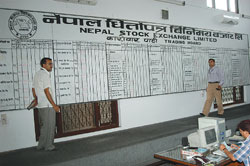|
|
Your weekly Beed is being buttonholed at parties, being asked why the stock prices are increasing and whether one should invest or not and in which stocks they should.
How should he know? It's hard to say when it comes to explaining stock market movements in general and in Nepal in particular. Millions have written doctoral theses about stock markets and how to predict their movements. An MIT maths professor made billions after devising a formula that could recognise patterns and predict the market. But at the end of the day, playing the stock market is a bit like gambling in a casino.
The NEPSE has zoomed considerably in the past six months. If one had invested, say, Rs 1,000 on listed stocks in 2005, the value today would be Rs 2,500. Considering the roller coaster ride that the economy has been through, this is phenomenal. The stock market starts to gallop when there are speculative instincts at play rather than technical analysis.
Equity investments are more scientific, but in a country where we still believe that its better to queue at empty gas stations than to leave it to the market, we would still like to consider playing in the secondary markets an extension of the card game, marriage.
Nepal's stock market volume is not at all small when we consider the market capitalisation of shares: the number of shares multiplied by the closing prices. The current capitalisation of $3 billion is nearly half of Nepal's GDP. So if one is to consider that at least ten percent of these shares are floating in the market, then there is about $300 million of shares that can be traded.
Considering the volumes of less than $10 million a day, the transactions are still small. Further, the size of our companies is very small. In India, the definition of small cap companies are those whose market capitalisation is less than $400 million. In Nepal, the largest companies would be less than this cap. So, there is a long way to go.
Stock market fluctuations can be volatile and a piece of paper can be worth a lot more or less in a matter of hours. A strong regulator is therefore necessary to ensure that the trading is close to efficient and also encourage more people to access the market for funds.
Unfortunately, in Nepal, the regulator sees itself as another government department and not really interested on how to take the markets ahead. A strong regulator can always encourage professionalism as well as growth, as has been demonstrated by the banking industry. Time has come to really make the regulator attuned to global practices, privatize the stock exchange and let the trading go electronic.
For investors to really reap benefits from stock markets, individual investors have to be replaced by institutional ones. This means mutual funds and other institutional investment possibilities must be opened up. Institutional investors can afford to employ people who can do better analyses and help in stabilising the secondary markets.
They need to be treated at par from the tax perspective as well as given incentives to take the risk of managing funds. These elements have to be of course looked at by the government, which has to formulate necessary legislation to ensure that the market grows and encourages companies to take the public company route. Surely, this needs to be linked to the constituent assembly!




